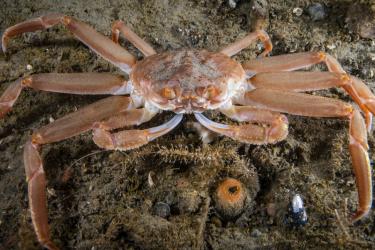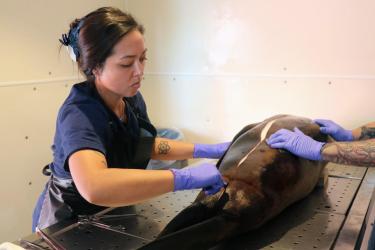In late February, scientists from the U.S. Antarctic Marine Living Resources Program wrapped up their research and construction activities at the new Holt Watters Field Camp in the South Shetland Islands. They came home to a welcome surprise: They had been awarded the Karo Field Unit Award by the Society of American Military Engineers.
The award recognizes outstanding contributions to engineering or science by a NOAA field unit. It honors the construction of a new field camp at Cape Shirreff, which replaced the old, deteriorating camp on Livingston Island. Cape Shirreff has been the home base for NOAA scientists studying the breeding success and population trends of Antarctic seals and seabirds for more than 25 years. Rebuilding the camp—from the design phase through the construction phase—took 3 years.
NOAA Corps Officer Lt. j.g. Alice Beittel, with the Southwest Fisheries Science Center Fisheries Resources Division, collaborates with the Society of American Military Engineers to help solicit nominations for the award. She was inspired to nominate the program by reading weekly construction updates from Cape Shirreff.
“I realized the Cape Shirreff project could be perfect, because it furthers our scientific capabilities through outstanding engineering practices and building a new camp in Antarctica is an awesome feat. It took a huge team! I was inspired by reading the updates and getting to witness the story,” said Beittel.
Dr. Douglas Krause is the Lead of the U.S. Antarctic Marine Living Resources Program. He was instrumental in establishing a partnership with the Colorado Building Workshop and Bespoke Project Solutions to design and build the new camp.
“When I found out that we had been not only nominated, but selected for this award, I was over the moon,” said Krause. “It was so exciting to know that you and the people you work with have done this amazing thing, and it’s very different when that thing is recognized by true experts who understand the challenges of logistics, construction, building, and engineering.”
The Karo Award is named in honor of Rear Admiral Henry Arnold Karo, who was the fifth director of the U.S. Coast and Geodetic Survey. He oversaw its expansion into the Environmental Science Services Administration, which was the predecessor of NOAA and the NOAA Commissioned Officer Corps. Although the award has existed for many years, this is the first time in more than a decade that it has been given out.
“Reintroducing this award is part of a recent push to revive a relationship with the Society of American Military Engineers that can build upon our history with them and our partnerships with other uniformed services and industry.”
The upcoming field season, beginning in November 2024, will be the first season that the completed new camp will be occupied. “I am astonished, proud, and so excited to move forward, using these new facilities and doing fantastic science, in such a new and exciting way,” said Krause.
Beittel is also excited that the program was selected for this honor.
“I think it speaks to the power of how important science communication is, even within our own agency, to highlight and share the accomplishments of our colleagues,” she said. “We need to remember to share our accomplishments, even internally. Hearing about the work of my colleagues is exciting and makes me proud to be part of this organization.”



